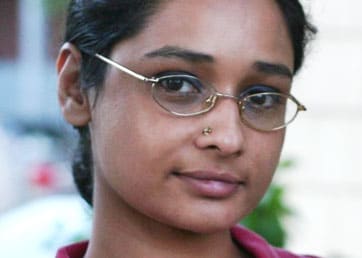
 Rusia Naureen Mohiuddin was born in Bangladesh in 1973, the year that two important cases dominated the United States news: Roe vs. Wade and the start of the Watergate hearings. She was born an identical twin, the pair born in the middle of four siblings. She says her journey towards social justice causes came before she was 13 years old.
Rusia Naureen Mohiuddin was born in Bangladesh in 1973, the year that two important cases dominated the United States news: Roe vs. Wade and the start of the Watergate hearings. She was born an identical twin, the pair born in the middle of four siblings. She says her journey towards social justice causes came before she was 13 years old.
Mohiuddin studied and graduated in New York, and after a nine month visit to Bangladesh, returned to the city to launch herself as the lead organizer for the Moshulu Woodlawn South Community Coalition.
Without any formal training, Mohiuddin successfully organized the first bilingual Bengali program in New York City at Public School 20 in the North West Bronx, a community with a high concentration of Bangladeshi families. There she organized more than 100 community members to start tenant associations and run four social justice campaigns in their neighborhoods.
Five and a half years ago Mohiuddin co-founded Social Justice Leadership, an organization based in New York City supporting leaders, organizers and supervisors to create authentic open relationships with those they work with.
Having worked in the five boroughs of New York City, Florida and California with youth, women and people of color, Mohiuddin started seeing patterns in people’s experiences.
People felt stuck in old habits that no longer served a purpose in their lives and didn’t know how to change. Staff in community organizing were underpaid and overworked with no real structure in place to appreciate or value the work they do. And, the needs of communities were so vast and global that the day-to-day work barely put a dent in the situations faced. Staff quickly became overworked, burned out and left.
In late 2004, Mohiuddin crafted a five-year vision for the work she felt she must do to infuse highly skilled, balanced and sustainable organizers into the social justice movement. Already in development, Mohiuddin, as the chief architect of ACTIVATE! The Community Fellowship Program, launched an intensive three-month program for intermediate, entry level folks and whole organizations to train together and develop skills sets that take care of their human and organizing needs.
"Some people want change that is tangible, that you can feel, but the most stark changes are small and have huge impact but we are only able to see them if we are engaged in day-to-day relationships with people," says Mohiuddin.
ACTIVATE! has not only become the staple of how Social Justice Leadership does their organizing work today, but has also revolutionized the way that organizers think about themselves within the movement. It was through ACTIVATE! that Mohiuddin solidified integrating the self into community organizing work, changing the way organizing is done while having a transformative impact in the lives of the people who attend the training.
Ultimately, this innovative integration became the basis for what will be the social justice leadership model of transformative organizing. This model, says Mohiuddin, "forces people to see their own humanity and the humanity of others in the pursuit of justice."
Today, Mohiuddin is taking what she has learned into the universe, reaching as many people as she can. "I want to be a part of something that has personhood at the center. I want to work for an organization not looking to be bigger than itself, where the expansion becomes more important than the work it is doing," said Mohiuddin.
The only way to secure that she will find this place is by creating it herself. This winter, Mohiuddin will be launching Universal Partnership, a consulting and training institute that believes that the heart of a sustainable movement moves to the beat of sustainable people.
As a woman of color in various leadership positions, Mohiuddin always had the opportunity to connect with the staff of where she worked but found it hard to be taken seriously by her male peers in leadership, no matter their race. She sees the many displaced and disempowering positions she has found herself in as a direct result of her being a women. No matter the injustice or oppression she faced, Mohiuddin made the struggle for gender equality secondary for the sake of maintaining relationships and getting her work done.
For those on the front lines, Mohiuddin says, "It’s important to believe in yourself even when everyone tells you not to, surround yourself with people who care about you and allow yourself to be impacted by the work that you are doing. It is not about changing the world, it’s allowing the work to shape you and who you need to be."
Of course this is easier said than done so look forward to Universal Partnership to support you on your journey of finding your humanity and dignity if you have lost it along the way.
Would you like to Comment but not sure how? Visit our help page at https://womensenews.org/help-making-comments-womens-enews-stories.
 Rusia Naureen Mohiuddin was born in Bangladesh in 1973, the year that two important cases dominated the United States news: Roe vs. Wade and the start of the Watergate hearings. She was born an identical twin, the pair born in the middle of four siblings. She says her journey towards social justice causes came before she was 13 years old.
Rusia Naureen Mohiuddin was born in Bangladesh in 1973, the year that two important cases dominated the United States news: Roe vs. Wade and the start of the Watergate hearings. She was born an identical twin, the pair born in the middle of four siblings. She says her journey towards social justice causes came before she was 13 years old.
